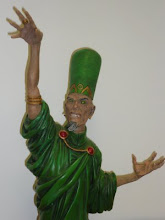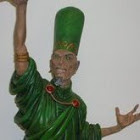 Given Charles Dickens' fascination with himself and his towering talent it is notable that he never wrote a full scale autobiography. He wrote a fragment which he gave to his friend and first biographer, John Forster, wrote a disguised version of his childhood in David Copperfield and wrote and spoke of his early adult life in letters, articles and speeches. Peter Rowland has doe a great job of assembling the fragments into as continuous a whole as could be managed.
Given Charles Dickens' fascination with himself and his towering talent it is notable that he never wrote a full scale autobiography. He wrote a fragment which he gave to his friend and first biographer, John Forster, wrote a disguised version of his childhood in David Copperfield and wrote and spoke of his early adult life in letters, articles and speeches. Peter Rowland has doe a great job of assembling the fragments into as continuous a whole as could be managed.Charles Dickens writing about Charles Dickens is as wonderfully engaging and astonishing as Charles Dickens writing about any of the cast that swagger through his astounding novels. That is the vibrant pleasure and deep frustration of the writing, it is clear that the person being spoken about or written about is essentially a character in a narrative, a beautifully crafted narrative of course.
Dickens is as funny, acute, charming and sentimental about himself as he is about any of his fictional children, he can freely deal with himself once the topic never strays near to the open would of his childhood that never healed. When he writes of the events that he thought would prevent him from ever achieving the greatness he felt he could and should achieve everything changes. There is no distance to the past, no careful staging of the events for maximum effect, there is only raw fear and pain.
It is very easy to see a colossal overreaction to a short lived event that arose from very ordinary circumstances and was finished for very ordinary reasons. Dickens'parents, his father in particular, was a man who loved to spend money, his own and any he could borrow from others. He spent in on being social and convivial, entertaining friends and being a gracious host. He lead his family from relative security in a government job to poverty and debt, living a life of hiding from creditors and constantly moving to different cheaper lodgings. Dickens mother had a relative who had a shoe polish business and she got Charles a job there, some time later after a row his father removed Dickens from the factory and put him in school.
Hardly a story of slavery and abuse, it scorched a hole in the life of Charles Dickens that never went cold and he was haunted and tormented by it for all of his life.
Charles Dickens always has a very powerful sense of his own innate talents, a sense that he would be someone, that others would recognise and acknowledge his talent, something that they would never do based on his social circumstances. Talent alone would be the path to success, social and financial and he knew that he had the energy, will and talent to succeed. Dickens felt that being sent to work in the shoe polish was closing the door on that prospect and keeping him locked in the life his parents were leading. He was right on both counts and this was inflamed by his powerlessness in the face of the actions of adults.
Charles Dickens did have a burning talent and the will to realise it, if he had remained in the factory he would have had essentially no chance of doing so, the leap up to social acceptable literary life from that point was too great. Dickens never forgot that it was chance that his father took him out of the factory and that his mother wanted him to be sent back.
The pieces, skilfully complied and edited by Peter Rowland in this book reveal Charles Dickens as he wished to be seen and as he never wished to be be know and they make a moving and wonderful partial self portrait of one of the monumental writers in history.


No comments:
Post a Comment